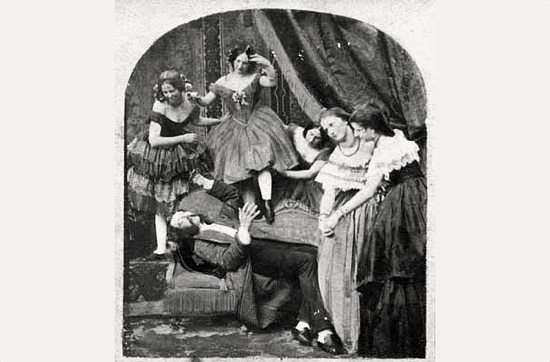Civil War: A house of maudlin revelry
“It appeared that this was the most disorderly house in town. The women, during the day, exposed their persons in the windows, and halloed at, threw at and spit upon all passers by.”

Richmond during the Civil War wasn’t exactly the most pristine and innocent place in the world. Ever since it was designated the capital of the Confederacy, Richmond was a place of turmoil. The city’s population grew to nearly four times its original size during the course of the war, with huge populations of transient soldiers coming and going at any given time. It was a place of commerce, the seat of power of the Confederate government, and–if you were trying to get into some kind of trouble–a great place to find illegal substances, gambling, prostitution, deserters, and criminals.
They weren’t really hard to find either. Due to bribery and a constant state of chaos, the local government couldn’t really do much to stop the illicit behavior. As soon as they shut down one house of gambling, two more would pop up–and so it would continue for the remainder of the war.
This also held true for houses of “ill repute,” of which there were dozens during the war and at least six within a three-block radius of the capitol building. Prostitution in Richmond was pretty well documented during the war in newspaper articles and census records. Some of these houses were classy affairs, geared towards figures in government and men of wealth and status. Others, well…not so much.
In July of 1864, a house off Franklin St. made its way into the Richmond Sentinel:
It appeared that this was the most disorderly house in town. The women, during the day, exposed their persons in the windows, and halloed at, threw at and spit upon all passers by. But when the sun went down arrived the time for the exercise of their most disagreeable practices. They got drunk and made night hideous with their maudlin revelry, which was varied by fights and shrieks and cries of murder. This sport was kept up throughout the greater part of every night, and persons living on Franklin street, a square off, could not sleep for the wild hurly-burly 7/1/1864
Sounds like a few VCU house parties I attended in my early 20’s.
Obviously, this kind of behavior was frowned upon by the neighbors who petitioned the police to come and do something about it. And so, they raided the house and arrested all the inhabitants:
Fourteen white women, of different ages, whose names we omit as of no earthly interest to our readers, were charged with keeping a house of ill-fame to the great annoyance of the people of their neighborhood. The women occupy the house on Wall street, near Franklin, known as Ruskell’s stable. It is a large new brick house, containing at least a dozen rooms, which are rented out separately.
Some how, probably from the lower part being once used as a livery stable, it has always been tenanted either by persons of the lowest character or of the most destitute description. More thieves and burglars have had their local habitation in it and been captured under its roof than in any other house of its age in the city. Several times all its tenants have been committed to jail as disorderly characters, but they either soon got at liberty and returned to it, like the sow to the more, or it was filled by persons of equally bad character.
Recently its inmates having become particularly disagreeable to the neighbors, complaint was made to the Mayor, who issued a warrant for the arrest of every person found in it. The warrant was executed by the police at a late hour Wednesday night, when the police found there fourteen women and three men. Ten of the women were under thirty and were of the vilest character, the dirtiest person and the most brazen face. – The other four were between forty-five and sixty and it was clear that only extreme poverty had driven them into such disreputable associations. Richmond Sentinel, 7/1/1864
With stories like this, it’s no wonder that Richmond was called “a second Sodom” by soldiers and newspapers alike during the Civil War. However, as long as there were both soldiers and citizens willing to pay, houses like these would continue to exist–even after the fall of Richmond into Union hands in 1865.
-
Recommend this
on Facebook -

Report an error
-

Subscribe to our
Weekly Digest




There are 2 reader comments. Read them.